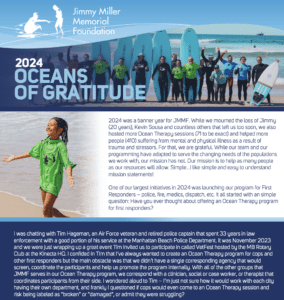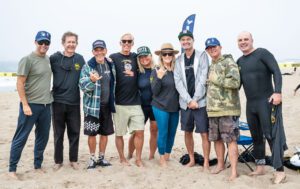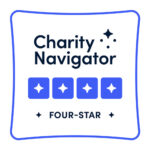It all started with an simple question: Have you ever thought about offering an Ocean Therapy program for first responders?
I was chatting with Tim Hageman, a retired captain that spent 33 years in law enforcement with a large percentage of his service with the Manhattan Beach Police Department. It was November and we were just wrapping up a great event Tim invited us to participate in called VetFest hosted by the MB Rotary Club at the Kinecta HQ. I confided in Tim that I’ve always wanted to create an Ocean Therapy program for cops and other first responders but the main obstacle was that we didn’t have a single corresponding agency that would screen and coordinate the participants. With all of the other groups that JMMF serves in our Ocean Therapy program, we work with a clinician, social or case worker, or therapist that coordinates participants from their side. I wondered aloud to Tim – I’m just not sure how it would work with each city having their own department, and frankly I questioned if cops would even come to an Ocean Therapy session and risk being labeled as “broken” or “damaged”
or admit they were struggling?
Being a cop for 33 years and on the front line responding to horrible traffic accidents, suicides, child abuse and other unimaginable violence, Tim shared that most first responders suffer from the effects of trauma but many don’t want to talk about it…mostly because of the culture in law enforcement and because any form of perceived “weakness” could be career compromising or career ending. Like many, they struggle isolated and alone. Not surprising then that the suicide rate among law enforcement is 53% higher than the general population. It’s also no secret that first responders, and specifically cops, have taken a media beating in recent years, and morale is at an all-time low. The calls to “Defund The Police” and social justice movements encouraging the killing of cops are not real motivating when your professional calling is to protect the health and safety of those that are out to bring you down. Tim admitted that the bridges between cops and their communities have been badly damaged in places, as well as the overall mental wellness in the first responder community.
The need is often hidden, but it is real.
My initial conversations with Tim sparked a desire to be part of a solution. Around this same time, I was introduced to another first responder turned wellness advocate name Matt Domyancic. Matt reinforced Tim’s perspective that many first responders probably wouldn’t attend an “ocean therapy” session but if we pivoted our focus from Post Traumatic Stress Disorder (PTSD) to Post Traumatic Growth (PTG), we could get some first responders to participate. Thus, was born JMMF’s FROPOWR – First Responders Oceanic Performance Optimization Wellness & Resiliency program!! And as an answer to prayer, because of his role as an independent chaplain to most of the agencies (police, fire, medics, dispatchers) in SoCal, Matt has become that internal advocate and “corresponding agency” that the First Responders trust and will talk to.
He is our conduit.
Lo and behold, Matt and Tim’s wise counsel was spot on. Every chief, peer support contact, wellness advocate and critical incident clinician at first chuckled at the acronym (we all know how first responders and the military LOVE their acronyms!) but they all agreed that surfing might just be the catalyst to get first responders to show up and try something new. In our initial meetings, we learned that the cultural attitudes towards mental health are changing, and the mental models are embracing wellness and being able to talk about the trauma and stressors that are almost guaranteed in the first responder profession. We witnessed this same shift in the military over the years and now that the stigma is being reduced, the gates are open for addressing the moral and psychological injuries that first responders suffer and recognizing mental health is a critical component in their overall wellness.
In one of the resources Matt shared with me – Setting My Sights On Stigma by Matt Bouchard (great insights into the first responder world) – the author quotes Lt Col Dave Grossman “A pain shared is a pain divided. A joy shared is a joy multiplied.” That is what our Ocean Therapy Program is all about! I offer my own corollary to this: “A pain not shared is a pain multiplied, and a joy not shared is a joy smothered.” At our Ocean Therapy sessions, we seek to create the safe space to divide the pain and multiply the joy so no one has to go it alone.
This past Saturday, we launched our FROPOWR Program with crew of brave first responders from various agencies in the LA area. Tears of joy, relief, and courageous vulnerability from everyone present. In one of the most emotional moments from the session, Matt Domyancic hesitantly suited up, got in the water and then surfed a “partywave” with his girlfriend with the biggest smile on his face I’ve ever seen. He was overwhelmed with joy.
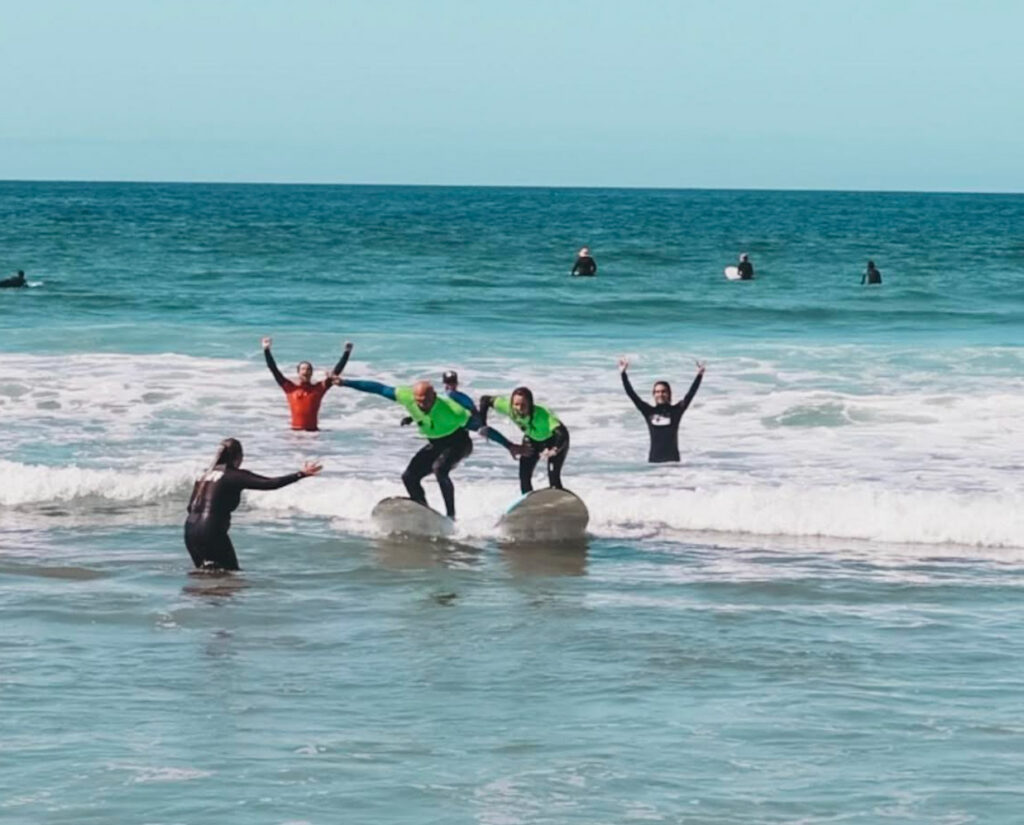
You see, Matt lived in Hermosa Beach, two blocks from the beach for 15 years and had only been in the ocean once – up to his waist – during that entire time. Matt admittedly had fears and rather than address them, he avoided them. Such a fitting metaphor for the trauma and fears that first responders face everyday while in the line of duty. We at JMMF all left the beach with a redoubled commitment to serving those that serve our communities, a mission of empowerment to assist those that need ocean therapy more than we, or even they, may realize and a sense of hope that the walls are coming down and the bridges are being repaired.
I invite you to come out and join us at more FROPOWR sessions on April 20th and May 10th, or volunteer at any of our other 80+ Ocean Therapy sessions we have scheduled in 2024. Wherever you are, help divide the pain and multiply the joy.
Forever grateful for our First Responders and the JMMF family,
Andy Dellenbach
CEO

